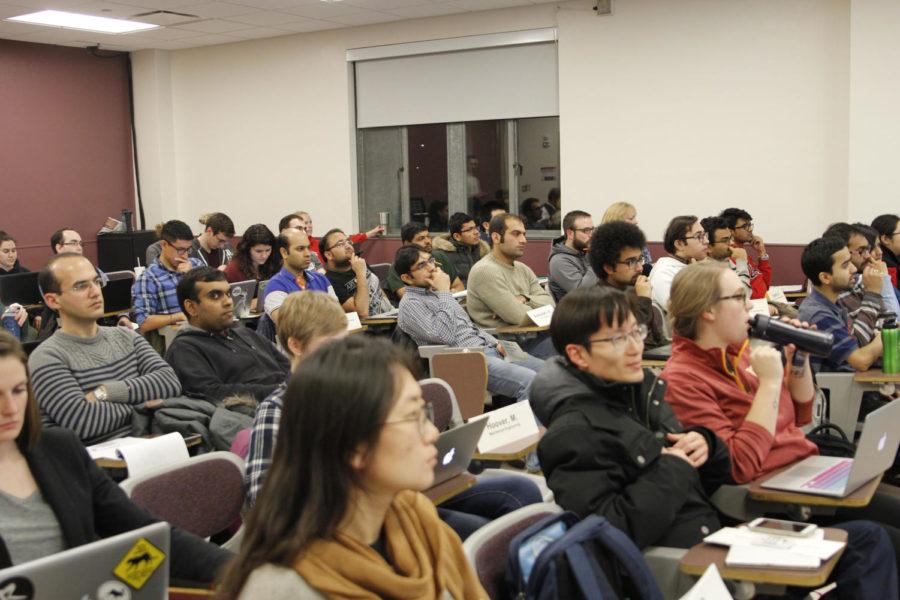- App Content
- App Content / News
- News
- News / Academics
- News / Politics And Administration
- News / Student Life
GPSS members address Trump travel ban fears
Chris Anderson/Iowa State Daily
Members of GPSS listen during Monday nights meeting at Pearson hall.
January 30, 2017
The Graduate and Professional Student Senate, GPSS, met for the first time since winter Monday night in Pearson Hall.
Senate members had much to discuss after President Donald Trump’s executive order signed Friday night, barring refugees and migrants from seven countries from entering the United States.
In an effort to calm the concerns of the GPSS members present, the International Students and Scholars Office’s (ISSO) interim director, Deb Vance, spoke at the meeting regarding Trump’s travel ban and what it meant for international students.
She said that those with student visas may now face longer wait times, processing times and additional scrutiny when reapplying due to the cancellation of the visa interview waiver program, which allowed people renewing visas of the same type, including F1 and J1 visas, to use a drop box system rather than attending an interview.
Everyone will need to go to an interview when they renew their visas,” Vance said. “No exceptions are available.”
With spring break coming up, when many students take vacations or visit their home countries, Vance stressed to GPSS members to avoid international travel if possible, as they may not be allowed to return, and to maintain their valid immigration status by staying out of legal trouble.
Vance fielded questions from members of the senate regarding their biggest concerns, including the executive order’s effect on work programs that allow international students to work in the United States for a temporary amount of time after graduation. She said that it isn’t included in the order but didn’t rule out the possibility of it eventually being affected.
GPSS members seemed mostly concerned about what the university was doing to help members of the Iowa State community affected by the travel ban. Vance said the ISSO is willing to connect students to immigration lawyers who may aid them. She also took note of other concerns voiced at the meeting, saying she would take them to her superiors.
Vance said that in her 35 years with the ISSO, this is the fastest she has seen things change in her time. Despite rapid changes, she promised that the ISSO would do all it could to help international students.
“If we don’t have the answers for you, we’re going to do our best to get them for you,” Vance said.
Craig Ogilvie, assistant dean of graduate students, also was in attendance to discuss the findings from the 2016 graduate college climate survey. He offered some information about the travel ban to concerned GPSS members, many of whom are international students.
“All students from the seven countries [included in the travel ban] have been contacted and asked if they need help,” Ogilvie said.
Ogilvie said there are approximately 102 graduate students from the seven countries specified in the executive order and that they are predominantly form Iran and Iraq.
Mostafa Amin-Naseri of the Iranian Students’ and Scholars’ Association was added to the open forum agenda just before the meeting. He offered his thoughts on the effects of the travel ban, which listed his own country.
“A large number of people in the ISU community are being severely affected by this,” Amin-Naseri said.
He said he hopes the ISSO will help international students by trying to voice their concerns to lawmakers so that steps might be taken to repair the effects of the first 90 days of this executive order.
GPSS members also listened to Ogilvie’s report on the graduate college climate survey.
Ogilvie said that 35 percent of graduate students who responded at Iowa State reported a negative experience in 2016. Also, 40 percent of transgendered grad students who responded felt threatened verbally or physically. The full report is not yet available on the Iowa State website.
Ogilvie said the dean’s office is taking steps to encourage a more inclusive environment for its students and hopes to initiate this by getting groups of people to interact with each other and talk about these issues in an attempt to try something other than “online training videos.”
Nicholas Flax, acting as a surrogate for Graduate and Professional Student research conference chair Akshit Peer, who was absent, said almost everything is planned and ready for the upcoming event, which is set for April 12.
He also said that while he can’t confirm an extension on the deadline for submitting presentation abstracts for the conference, which are due Tuesday, the deadline has been extended most years and probably will be this year if there’s a lack of submissions by the original deadline.
The next GPSS meeting will be Feb. 27. Agendas and meeting minutes can be found on its website.
















